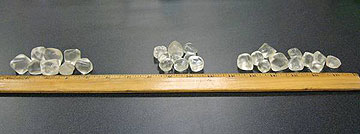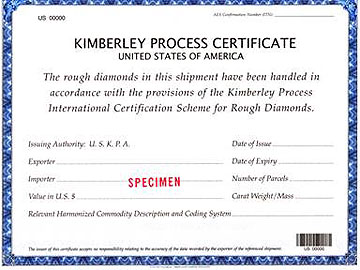 |
 CBP Protects Legitimate Diamond Trade, Thwarts Importation of 'Blood Diamonds'
(06/01/2010) U.S. Customs and Border Protection works to ensure diamonds are humankind’s friends. Diamonds have long been a symbol of devotion and love, however in the 1990s, certain diamonds developed a less savory reputation as blood diamonds because of their association with inhuman acts. The blood diamond trade has funded the overthrow of legitimate governments and impeded international efforts to promote peace and stability that have led to human rights violations against unarmed civilians. U.S. Customs and Border Protection works to ensure diamonds are humankind’s friends. Diamonds have long been a symbol of devotion and love, however in the 1990s, certain diamonds developed a less savory reputation as blood diamonds because of their association with inhuman acts. The blood diamond trade has funded the overthrow of legitimate governments and impeded international efforts to promote peace and stability that have led to human rights violations against unarmed civilians. |  | click for hi-res
 | | On April 11, 2009, CBP officers at New York's JFK Airport seized these 28 rough cut diamonds (total of 1,200 carats) from a passenger arriving from Sierra Leone. |
|
|  |  |
CBP is a key player in combating the blood diamond market. In 2003, Congress designated CBP as the United States’ “importing authority” for diamonds. This authority ensures that CBP protects the legitimate diamond trade and the American consumer.Prior to 2003, both the United Nations and the United States grew concerned that part of the trade in rough or uncut diamonds was fueling illegal and inhuman activities in several African nations. Throughout the 1990s and into the next decade, approximately 3.7 million people were killed, and more than 6.5 million others were driven from their homes by armed conflict centered in Sierra Leone, Angola and the Democratic Republic of the Congo. The impetus was the desire by insurgents to take control of the diamond mines, which could then be exploited to underwrite their violent activities. The diamonds acquired by these insurrectionaries came to be known as “blood” or “conflict” diamonds. |  | click for hi-res
 | | Official Kimberley Process Certificate issued by the United States -- each member nation has its own process certificate. |
|
|  |  |
Both the human toll and the potential to disrupt the international diamond trade helped to build consensus among nations, the World Diamond Council, human rights organizations, and the United Nations. The United States, as the consumer of the majority of the world’s diamonds, saw the need to sever the link between diamonds and the ongoing conflict around Africa.The solution was the creation of the Kimberley Process Certification which ensures that importers of diamonds into the United States follow strict international trade rules and regulations. The process consists of two parts: A uniquely numbered, government-validated certificate stating the diamonds are from sources free of conflict, and the use of tamper proof shipping containers that ensure the diamonds in transport are those described in the certificate. Congress codified this process through the Clean Diamond Act of 2003, which authorized CBP to enforce the Act and ensure that all diamonds imported into the United States adhere to the Kimberley Process.Today, CBP continues to protect the international community and provides assurance to American consumers that the diamonds they purchase do not fund human rights violations in Africa. Diamonds imported into the United States that do not adhere to the Kimberley Process are seized by CBP, thus safeguarding and facilitating a legitimate international diamond trade.  |
 |
|  |  |
 |